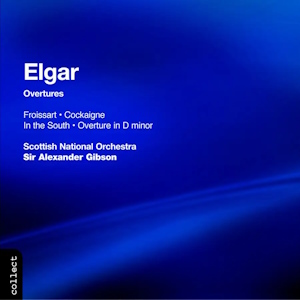
Sir Edward Elgar (1857-1934)
Froissart, concert overture, Op.19 (1890)
Cockaigne (In London Town), concert overture, Op.40 (1901)
In the South (Alassio), concert overture, Op.50 (1904)
Overture in D minor, from Chandos Anthem No.2 (G.F. Handel/Elgar) (1923)
Scottish National Orchestra/Sir Alexander Gibson
rec. 1982, Henry Wood Hall, Glasgow, UK
Presto CD
Chandos CHAN6652 [54]
Gibson’s Elgar overtures album, recorded for Chandos LP back in 1982, returns under Presto’s aegis. It was reviewed here over two decades ago by the late Terry Barfoot and I’m more than happy to endorse his characteristically wise words on the splendidly successful recording sessions that produced such robust, characterful and engagingly involved performances from a truly on-song Scottish National Orchestra under Alexander Gibson.
The essential virility of Gibson’s approach is matched by a top-to-bottom recording that gives as much prominence to the basses as the brass and doesn’t stint the winds. The sound perspective is outstanding. Froissart suits Gibson’s bluffly avuncular approach and its ceremonial aspects. Andrew Porter once wrote of the visiting Scottish National when it played some years earlier (in the late 1970s) in Los Angeles that its ‘long free phrasing is a glory of the orchestra’ which Gibson moulded into an ‘elegant and poetic if not, by Chicago standards, virtuoso ensemble’. That’s about right. Gibson’s Froissart sits very well alongside Barbirolli’s – something of a mentor to Gibson and a man who had, years before, directed the Scottish Orchestra – though very much more spectacularly recorded.
Cockaigne, too, is punchy, athletic and full of orchestral colour and detail – and splendidly captured percussion. If it lacks Barbirolli’s natural, unselfconscious affection for his native city, it lacks for little in detailing and nuance, though perhaps the violin section of the orchestra could have had more tonal body. Gibson’s In the South may not quite match the tremendous sense of elation and bravura that Silvestri generated in Bournemouth in 1968 but then Silvestri can’t quite compete sonically with the spectacularly visceral Chandos recording. Interpretatively, I’d take Silvestri by a whisker but sonically it has to be Gibson.
The final work is one of Elgar’s Baroque hyphenations. His transcription of Handel’s Overture in D minor, the overture to the Chandos Anthem No.2, should ideally be heard alongside that of Bach’s Fantasy and Fugue in C minor to show Elgar’s gloriously imaginative response to music of the past. This Handel-Elgar recording includes the ad libitum organ part which adds noticeably to the rousing nature of the enterprise. Frisson, for sure.
It’s good to know that this recording, made over forty years ago, is still flying high.
Jonathan Woolf
Previous review: Terry Barfoot (February 2003)
Buying this recording via a link below generates revenue for MWI, which helps the site remain free


















